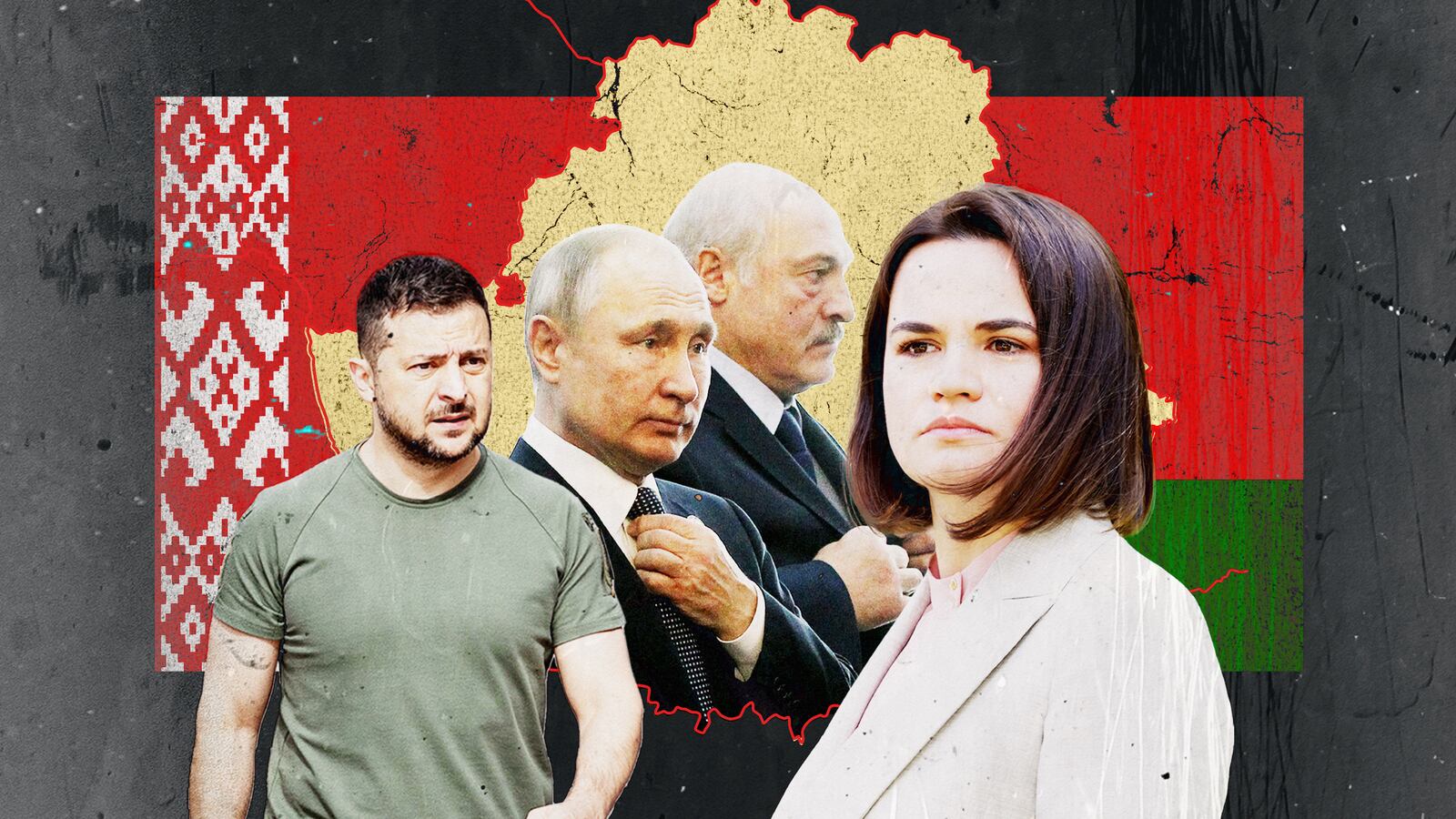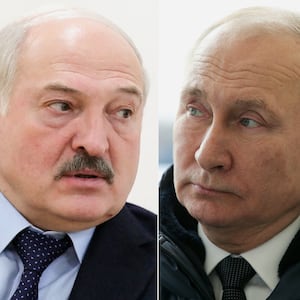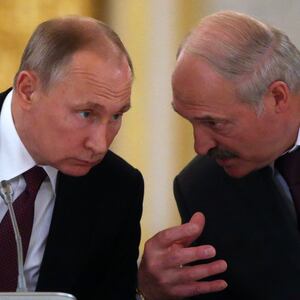Belarus’ opposition, led by Sviatlana Tsikhanouskaya, is plotting to form an alliance with Ukrainian President Volodymyr Zelensky to try to hamper any hopes that Russia may have of territorial expansion beyond Ukraine and further into Europe.
The concern is that Russian President Vladimir Putin is eyeing Belarus much like how he’s eyeing Ukraine—and hoping to envelope Belarus into Russia itself, Valery Kavaleuski, a foreign affairs representative for the Belarusian opposition leader, told The Daily Beast.
“Russians are looking at us in the same light as they look at Ukraine,” Kavaleuski said. “‘This is a state that is temporarily dependent. This is the nation that does not deserve to be next to Russia, so they all have to be ‘Russified.’’ This is their basic understanding of how the world should work.”
Concerns have been mounting in European countries that Putin is interested in invading countries beyond just Ukraine for months now. Some fears have grown that Putin is interested in attacking the Baltics, Poland, or even the U.K. and the United States.
And an incursion or takeover in Belarus, in theory, could give Putin easier access to Latvia, Lithuania, and Poland.
“When you look at the map, you see that these are basically the most important countries on the way from Russia to Western Europe,” Kavaleuski told The Daily Beast. Democratic Belarus and Ukraine should be working closely to resolve the “grave threat to our statehood in both countries,” he said.
It’s not clear if Putin has designs over Belarus in the near term. Belarus’ relationship with Russia is complex—the U.S. State Department assessed early this year that it’s not clear where the power of the Belarusian dictator, Alexander Lukashenko, ends, and where Putin’s power begins. Moscow and Minsk have established what they call a “union state,” in which each year the two countries fuse their banking, military, and other sectors closer and closer together.
Just this year, Lukashenko has allowed Russia to barrel in and use Belarus as a launching ground for attacks on Ukraine, including the failed effort to capture Kyiv early in the war.
In recent weeks, Belarus and Russia have been working on launching a joint military grouping and are conducting live fire exercises in Belarus. Russia is currently sending approximately 9,000 troops and hundreds of armored vehicles into Belarus in preparation for potential deployment, just as Russia faces mounting losses in Ukraine, Belarusian defense officials said.
But Tsikhanouskaya, who ran for president in 2020 against Lukashenko and is recognized around the globe as the legitimate representative of the Belarusian people, is reading between the lines that Lukashenko is not an equal partner to Putin and has almost entirely ceded his power to Moscow. Her judgment is that now is the time to turn a new page with an eye to the future—one where Lukashenko is not necessarily in power.
“Belarusians are not equal to Lukashenko. Lukashenko is a disgrace to my country. It is him and Putin who are dragging our country into the war. Lukashenko is not the decision-maker anymore, the Kremlin is,” Tsikhanouskaya said in her alliance proposal to Zelensky.
Tsikhanouskaya noted in remarks early this month that recent battlefield losses could weaken Lukashenko, providing pro-Democracy Belarusians a window.
"We have a distracted Russia that is about to lose this war. It won't be able to prop Lukashenko up with money and military support as in 2020,'' she said at the Warsaw Security Conference.
Ukraine and her team ought to band together for “joint action” moving forward, she said.
“We are proposing to build an alliance with democratic Belarus,” Tsikhanouskaya said in her proposal. “I am convinced that Russia will be defeated, and Ukraine will restore its territorial integrity and defend its independence. Ukrainians are now writing the history not just of their own, but that of the world… We are ready for joint action with Ukraine.”
The alliance would be focused on building close relations across multiple spheres, from social to economic, as well as military and diplomatic relations, her team told The Daily Beast. Kavaleuski said their team would be interested in security guarantees that Ukraine is working to gain as well.
Forming an alliance would likely be a natural next step, Scott Rauland, the former chief of mission at the U.S. Embassy in Belarus, told The Daily Beast.
“It would be in Zelensky’s best interest to make common cause with the Belarusian opposition. They have a common enemy,“ Rauland said. “They've faced similar levels of repression from Russia in different ways, but the pattern has been been largely the same.”
And if Lukashenko were to one day be ousted from power, pushing back against Russian influence would be key, Rauland noted. Tsikhanouskaya and her team “would be ready to serve as a transitional government should Lukashenko ever leave the scene,” he said.
Tsikhanouskaya is on the same page. In August, she and her team established a temporary executive body, the United Transitional Cabinet, in an attempt to centralize her team’s efforts to create conditions for free elections and “ensure the transit of power from dictatorship to democracy.”
Belarus’ opposition is not expecting a quick response from the Zelensky administration on the potential partnership, Kavaleuski said, noting that his team suspects that the quick formation of any such alliance might be viewed by Lukashenko as a provocation.
“The Ukrainian government now is very, very cautious with regard to communicating with the Democratic Belarus, they are concerned that these contexts might provoke Lukashenko into invasion,” Kavaleuski said. “We understand as a region so we are taking our time. We are not sort of pushing them because we understand that the stakes are very, very high.”
Zelensky’s office did not immediately return a request for comment.
Lukashenko has been warning in recent days that he views neighboring countries’ activities and partnership with the North Atlantic Treaty Organization as aggressive and provocative, with an eye towards Poland and Ukraine.
Ukraine has maintained a defensive line near the Belarus-Ukraine border in a recognition that Belarus could potentially launch an attack on Ukraine from the north.
But as the Belarusian opposition sees it, there’s room for positive thinking.
“Even though we don't have the resources of the state, we have the legitimacy of the Belarusian people we have legitimacy of the international community, and if we have the support—the political support, diplomatic support—of Ukraine, now we can do much more for Ukraine and for our own country,” Kavaleuski said.








